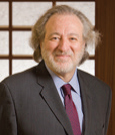Although most major cancer centers in the United States offer support groups and individual counseling sessions to help patients with cancer cope with their disease and treatment, over the past decade Memorial Sloan Kettering Cancer Center in New York has broadened its psycho-oncology programs to include interventions for patients, cancer survivors, and caregivers. Recently, the cancer center established the Program for Family Care in Cancer, which integrates novel types of counseling interventions for patients with advanced cancer, as well as for bereaved parents who have lost a child to cancer, cancer survivors, caregivers, and bereaved family members.
Inspired by Holocaust Survivor
One approach used by clinical researchers in the program is meaning-centered psychotherapy, which provides people touched by cancer with a way to find a sense of meaning, hope, peace, and purpose in their lives. This approach was developed by William S. Breitbart, MD, Acting Chair, Department of Psychiatry and Behavioral Sciences and Chief of the Psychiatry Service at Memorial Sloan Kettering, and is based on the writings of Viktor Frankl, MD, PhD, who was an Austrian neurologist and psychiatrist and Holocaust survivor.
Dr. Frankl’s book, Man’s Search for Meaning (Beacon Press, 1959), chronicles his experiences as a concentration camp inmate and describes his conviction that people can find meaning and a reason to continue living even in the most difficult circumstances.
Meaning-centered psychotherapy is a manualized treatment that includes contemplation exercises and discussion. It has been evaluated in randomized controlled clinical studies conducted by Memorial Sloan Kettering investigators, and delivered in individual and group counseling sessions or via the Internet. Two years ago, Dr. Breitbart published the results of his study on individual meaning-centered psychotherapy for patients with advanced cancer.1
The study investigated brief interventions targeting spiritual well-being and meaning for patients with stage III or IV cancer. The researchers enrolled 120 patients in treatment at Memorial Sloan Kettering who had a life expectancy of 6 months or less. The patients were randomly assigned to seven sessions of either individual meaning-centered psychotherapy or therapeutic massage. Those assigned to the meaning-centered psychotherapy met for 1 hour with a therapist to explore personal sources of meaning in their lives, such as love, relationships, and work, and to discuss existential themes, such as hope, legacy, and the impermanence of life.
Combatting Fear of Recurrence
The results show that patients receiving individual meaning-centered psychotherapy had improvement in their quality of life and spiritual well-being and fewer physical symptoms such as pain. In contrast, the patients receiving massage therapy alone reported no significant benefit. Dr. Breitbart and his colleagues in Memorial Sloan Kettering’s Program for Family Care in Cancer have recently adapted meaning-centered psychotherapy programs for breast cancer survivors, bereaved parents, caregivers, and Chinese patients with cancer. (See “Clinical Studies in Psychotherapy Currently Recruiting Participants,” on page 150.) There is also an intervention study targeting fear of disease recurrence in breast cancer survivors.
“The whole psycho-oncology world is struggling with developing some type of effective psychotherapy interventions for fear of recurrence among breast cancer survivors,” said Dr. Breitbart. “I think our research is perhaps the most promising, because most of the research I’ve seen based on cognitive behavioral therapy has not been very impressive. Our hope is to expand this study to include survivors of ovarian cancer with a fear of recurrence. Fear of recurrence is a common issue for many cancer survivors.”
The clinician/researchers involved in the Program for Family Care include Allison J. Applebaum, PhD, Director of the Caregivers Clinic; Wendy G. Lichtenthal, PhD, Director of the Bereavement Clinic; Christina G. Salley, PhD, Pediatric Psychologist; and Talia I. Zaider, PhD, Clinical Psychologist in the Family Therapeutic Clinic and Associate Co-Director of Memorial Sloan Kettering’s Psychotherapy Laboratory. ■
Disclosure: Dr. Breitart reported no potential conflicts of interest.
Reference
1. Breitbart W, Poppito S, Rosenfield B, et al: Pilot randomized controlled trial of individual meaning-centered psychotherapy for patients with advanced cancer. J Clin Oncol 30:1304-1309, 2012.






